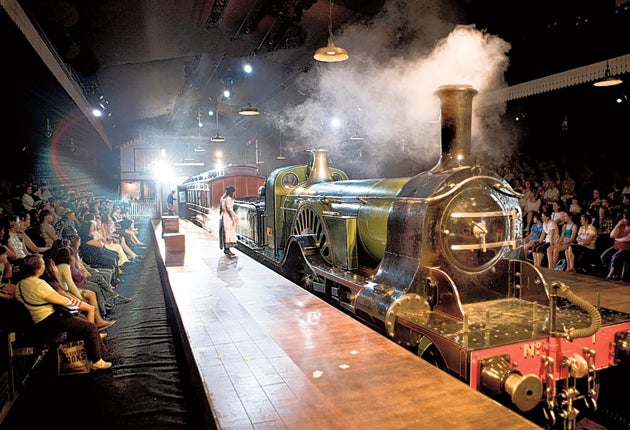John Walsh: Just keep Gordon off the politics

Consternation and ridicule have greeted the news (on The Spectator's blog) that Gordon Brown is looking for a new career as an after-dinner speaker, and hopes for $100,000 for a night's work. (For $20,000 more, Sarah Brown will come too, either to hand out prizes or stand around looking supportive, like Linda McCartney in the line-up of Wings, but without the tambourine.)
It's piquant to discover that Mr Brown asked a top speakers' agency to find him bookings in the Middle East and Asia, rather than in, say, Hackney or Glasgow, where he might receive a less enthusiastic welcome. What's the impulse behind his new ambition? Can it have anything to do with the news that Tony Blair has been paid £240,000 for a 20-minute speech in Japan?
But I'm all in favour of Gordon seizing this chance to reinvent himself, because I know he's rather an amusing talker. You think I'm kidding? Not at all. I remember his appearance at The Independent's 20th birthday celebrations, when he discussed his ambiguous feelings about nature. How, before new Labour took office, he used to write an economic policy document of utter brilliance, release it to the press and open the Indy next morning, expecting either praise or some intellectually robust criticism. "Instead," he said, "the front page would be filled with some vital enquiry like, 'What's become of the common lapwing?'" The crowd was convulsed.
I saw Mr Brown at the Hay Festival (where Bill Clinton, coincidentally, came to deliver a $100,000-for-an-hour speech when he'd just left power) where he was interviewed by Mariella Frostrup. He was chatty and forthcoming, and deployed that after-dinner staple, Famous People I Have Met (he told a funny story about Nelson Mandela and Hilary Benn.) He tried out a version of that cornerstone of Richard Pryor's stand-up routine, Things That Puzzled Me As a Child (a sober-minded kid, he read about Edith Cavell "and wondered how anyone could kill a nurse.") And he amused the audience with tales of The Wacky Jobs I Had Before I Got Serious – in his case it was editing a books programme on Scottish TV, on to which he invited Anthony Burgess and Hugh McIlvanney. He was terrific. Then – disaster – someone asked him about politics. His eyes became hooded. His hands went into their chopping-onions gesture, and he went back to being boring, opaque and self-righteous. So welcome GB, the after-dinner smoothie, provided he can be kept off certain subjects. Like being a prime minister, say.
This production takes special effects up a gear
The York Theatre Royal's production of The Railway Children in the old Eurostar terminus at Waterloo Station is a revelation. The audience sits on either side of a single track, and the action takes place on a series of sliding blocks. The arrival and passing of trains are suggested by clouds of steam, whistles, lights – and of course the spectacle of a genuine, huge steam train that glides onstage, as it were, like a vast green monster. It's all so inventive, so well acted and (under the circumstances) confidently staged that after a while you forget you're watching a play in, you know, a draughty train station.
Three years ago, I raved about a production of Brief Encounter at the Haymarket Cinema. It also featured a life-size train, projected by camera on to a long curtain (in a brilliant coup de cinema, the flesh-and-blood Trevor Howard character disappeared behind the curtain and turned up on-screen) and I wondered where ambitious, specials-effect theatre might go from there. Now I know. But I was intrigued by a programme note, in which the director, Damian Cruden, spoke dreamily about "creating theatre in an industrial space," and about an event he saw in Glasgow, where a whole ship was built and launched before the audience's eyes. Blimey. Stand by for the NT's (not too short-lived, I hope) floating production of Titanic.
Make mine a tall one. No, wait...
Professor Lynne Rosenthal, the woman who was allegedly thrown out of a Manhattan Starbucks for refusing to say, "A plain bagel without butter or cheese, please," rather than "A plain bagel, please," may sound a touch barmy, but you can't help sympathise with her. Even reading the news report of how she called the barista "you asshole," I feel a twinge of irritation about the word "barista" (it's Italian for "bartender") and how it's snuck into the language, as if we've all been using it for years.
Many caffeine addicts have objected to the pressure they feel, in these gleaming cafes, to use the made-up language of cup sizes – Tall (meaning small), grande (medium) and venti (large). Remember the scene in the film Role Models, where Paul Rudd testily explains to a lady "barista" that he wants a large black coffee? "You mean venti," she says, "Venti means large."
"No," says Rudd, "Venti means 20. Large means large. Tall means large. And grande is Spanish for large. Venti is the only word that doesn't mean large".
I had a similar altercation years ago, when I asked for a small mocha. "Tall mocha," nodded the girl, writing "M" on the side of the cup. "How can you call it 'tall'," I demanded, "when it's the smallest available coffee? Look at the cup. Does that strike you as tall? It's not tall. It's actually rather squat. If anything, it's stunted. I'll have a squat mocha. I'll have a stunted mocha." She fixed me with a scornful gaze. "Do you have some hang-up about size," she said, "that you'd like to share with us?" That shut me up.
j.walsh@independent.co.uk
Join our commenting forum
Join thought-provoking conversations, follow other Independent readers and see their replies
Comments
Bookmark popover
Removed from bookmarks